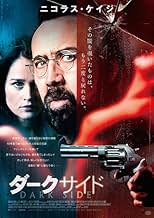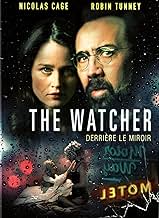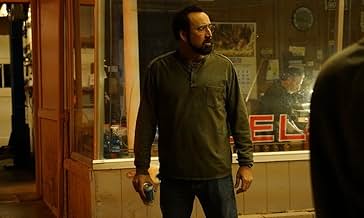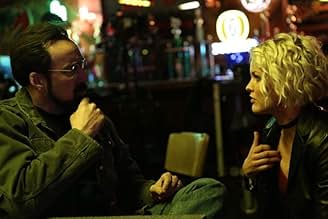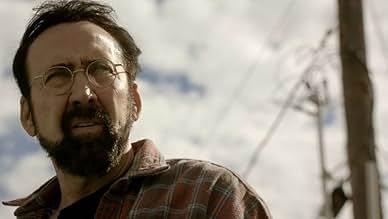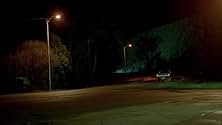ÉVALUATION IMDb
4,7/10
8,2 k
MA NOTE
Un couple achète un motel dans le désert où ils constatent que des événements étranges et mystérieux se produisent.Un couple achète un motel dans le désert où ils constatent que des événements étranges et mystérieux se produisent.Un couple achète un motel dans le désert où ils constatent que des événements étranges et mystérieux se produisent.
Kimmy Jimenez
- Becky
- (as Kimmy Hittelman)
Histoire
Le saviez-vous
- AnecdotesIn interview with The Hollywood Reporter, Robin Tunney described Nicolas Cage as one of greatest actors ever, saying she never enjoyed working with someone as much as him.
- GaffesAt about 45:20, when Cage walks up to Tunney sitting on the computer, both of their wireless mic packs bulge out on their belts.
Commentaire en vedette
There are few actors who alternate between commercial and personal projects- that "one for me, one for them" concept- more than Nicolas Cage. For every interesting, quality film he makes, like Michael Sarnoski's 'Pig,' there are ten others, lacking artistic merit or entertainment value. Forgettable actions films, like Dimitri Logothetis' 'Jiu Jitsu,' or mediocre melodramas like Maria Pulera's 'Between Worlds' litter Cage's filmography, outweighing the genuinely good films he stars in. However, even in the worst of his movies- those clearly made just for the paycheque- Cage is usually interesting to watch, and, more often than not, highly entertaining.
Unfortunately, this is not the case with Tim Hunter's overwhelmingly dull 'Looking Glass.' The film follows Ray and Maggie, a married couple suffering from the loss of their daughter. They purchase a motel in an isolated town in Arizona. One day, Ray discovers a secret underground hallway, leading to a two-way mirror, allowing him to see into one of the motel rooms and spy on the guests. As Ray becomes obsessed with voyeurism, sinister events unfold, as he becomes embroiled in a seedy plot that he and Maggie may not survive.
It is a cliched picture, a David Lynch rip-off that lacks the suspense and surrealness of his work. Written by Jerry Rapp and Matthew Wilder, the narrative is predictable and unengaging. The film moves at a pace that would irritate a snail, and the underwritten characters lack depth. Moreover, the dialogue is stilted, the characters acting like robots; disconnected from the reality of their situation.
Ray and Maggie are plunged into a dark underworld of sadomasochism and violence, and do not react to it like real people would, pottering around in the motel, disassociated and confused. The supporting characters are one-note cliches, and the identity of the villain of the piece is evident from the moment they appear on screen. It is a shame it is so mundane and quotidian, as the concept of a motel owner becoming a voyeur- mirroring the real-life case of Gerald Foos, who reconstructed his motel to allow him to spy on his guests- could make a great film.
However, director of photography Patrick Cady effectively generates a Lynchian atmosphere of murky danger. The low-lighting, combined with Cristopher R. DeMuri's ominous production design, creates tension and a headily menacing mood. Additionally, the score- from Mark Adler, Kristin Gundred and Andrew Benjamin Miller- signifies doom.
Unfortunately, the visuals and score don't elevate the picture out of mundanity. Despite scenes of S&M, brawling and murders, the film isn't in any way suspenseful or engaging, and the cast do unimpressive work. Cage underplays the role of Ray, trying to give a subtle performance, but overdoes it. He is criminally boring, moping about the motel, looking like a lethargic, bespectacled rabbit caught in the headlights. Robin Tunney is given nothing to do as Maggie; her talents are completely wasted, and she fades into the background. Marc Blucas, as the local Sherrif, does the strongest work, though his character is woefully one-dimensional.
While it's interesting how Nicolas Cage alternates between diverse projects- and while some miss the mark- his performances are generally intriguing. Unfortunately, this can't be said for his work in 'Looking Glass'. Although the visuals and score are atmospheric, the narrative is formulaic, the dialogue is mannered and the characters- as well as the situation they're in- are unbelievable. Sadly, 'Looking Glass' is not worth a glance.
Unfortunately, this is not the case with Tim Hunter's overwhelmingly dull 'Looking Glass.' The film follows Ray and Maggie, a married couple suffering from the loss of their daughter. They purchase a motel in an isolated town in Arizona. One day, Ray discovers a secret underground hallway, leading to a two-way mirror, allowing him to see into one of the motel rooms and spy on the guests. As Ray becomes obsessed with voyeurism, sinister events unfold, as he becomes embroiled in a seedy plot that he and Maggie may not survive.
It is a cliched picture, a David Lynch rip-off that lacks the suspense and surrealness of his work. Written by Jerry Rapp and Matthew Wilder, the narrative is predictable and unengaging. The film moves at a pace that would irritate a snail, and the underwritten characters lack depth. Moreover, the dialogue is stilted, the characters acting like robots; disconnected from the reality of their situation.
Ray and Maggie are plunged into a dark underworld of sadomasochism and violence, and do not react to it like real people would, pottering around in the motel, disassociated and confused. The supporting characters are one-note cliches, and the identity of the villain of the piece is evident from the moment they appear on screen. It is a shame it is so mundane and quotidian, as the concept of a motel owner becoming a voyeur- mirroring the real-life case of Gerald Foos, who reconstructed his motel to allow him to spy on his guests- could make a great film.
However, director of photography Patrick Cady effectively generates a Lynchian atmosphere of murky danger. The low-lighting, combined with Cristopher R. DeMuri's ominous production design, creates tension and a headily menacing mood. Additionally, the score- from Mark Adler, Kristin Gundred and Andrew Benjamin Miller- signifies doom.
Unfortunately, the visuals and score don't elevate the picture out of mundanity. Despite scenes of S&M, brawling and murders, the film isn't in any way suspenseful or engaging, and the cast do unimpressive work. Cage underplays the role of Ray, trying to give a subtle performance, but overdoes it. He is criminally boring, moping about the motel, looking like a lethargic, bespectacled rabbit caught in the headlights. Robin Tunney is given nothing to do as Maggie; her talents are completely wasted, and she fades into the background. Marc Blucas, as the local Sherrif, does the strongest work, though his character is woefully one-dimensional.
While it's interesting how Nicolas Cage alternates between diverse projects- and while some miss the mark- his performances are generally intriguing. Unfortunately, this can't be said for his work in 'Looking Glass'. Although the visuals and score are atmospheric, the narrative is formulaic, the dialogue is mannered and the characters- as well as the situation they're in- are unbelievable. Sadly, 'Looking Glass' is not worth a glance.
- reelreviewsandrecommendations
- 28 juill. 2024
- Lien permanent
Meilleurs choix
Connectez-vous pour évaluer et surveiller les recommandations personnalisées
- How long is Looking Glass?Propulsé par Alexa
Détails
Box-office
- Brut – à l'échelle mondiale
- 76 788 $ US
- Durée1 heure 43 minutes
- Couleur
- Rapport de forme
- 1.78 : 1
Contribuer à cette page
Suggérer une modification ou ajouter du contenu manquant

Lacune principale
What was the official certification given to L'effet miroir (2018) in India?
Répondre

